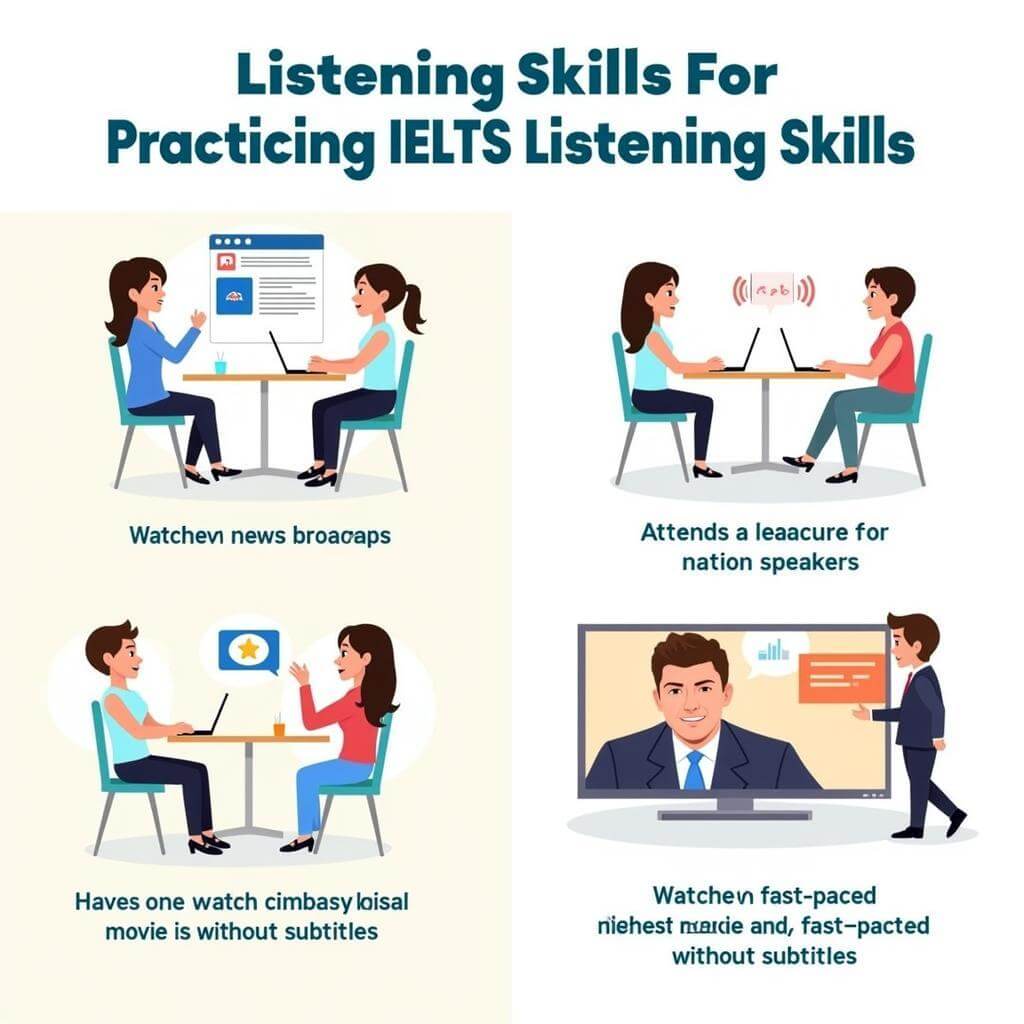The IELTS Listening test can be particularly challenging, especially when it comes to handling fast-paced audio sections. As an experienced IELTS instructor, I’ve seen many students struggle with this aspect of the exam. However, with the right strategies and consistent practice, you can significantly improve your performance in these tricky parts of the test.
Understanding Fast-Paced Audio Sections
Fast-paced audio sections in IELTS Listening typically involve rapid speech, multiple speakers, or a high density of information. These sections are designed to test your ability to process information quickly and accurately under pressure.
Handling audio with varying speeds is a crucial skill for IELTS success. Fast-paced sections often appear in Parts 3 and 4 of the Listening test, where academic discussions or lectures are common.
Common Characteristics of Fast-Paced Audio:
- Rapid speech delivery
- Multiple speakers with quick turn-taking
- Dense information with little pause between key points
- Complex vocabulary and idiomatic expressions
- Background noise or distractions
Strategies for Tackling Fast-Paced Audio
To effectively handle fast-paced audio sections, you need to develop specific skills and employ targeted strategies. Here are some expert tips to help you navigate these challenging parts of the IELTS Listening test:
1. Anticipate and Predict
Before the audio begins, carefully read the questions and try to predict the type of information you’ll need to listen for. This mental preparation can significantly improve your ability to catch key details.
2. Focus on Keywords
Focusing on specific keywords is essential in fast-paced sections. Identify and underline key terms in the questions to guide your listening.
3. Develop Note-Taking Skills
Efficient note-taking is crucial. Practice writing quick abbreviations and symbols to represent key information without losing focus on the audio.
4. Practice Active Listening
Train yourself to actively engage with the audio, constantly relating what you hear to the questions at hand. This helps maintain concentration and improves information retention.
5. Improve Your Concentration
Work on extending your concentration span. Regular meditation or mindfulness exercises can help enhance your ability to focus for extended periods.
Practical Exercises for Improvement
To enhance your skills in handling fast-paced audio sections, try these exercises:
- Listen to podcasts or TED Talks at 1.25x or 1.5x speed
- Practice with IELTS mock tests, focusing specifically on Parts 3 and 4
- Engage in timed note-taking exercises while listening to academic lectures
- Try shadowing exercises, where you repeat what you hear immediately after the speaker
Handling fast-paced audio effectively requires consistent practice and the right approach. Remember, improvement takes time, so be patient with yourself.
Common Pitfalls to Avoid
When dealing with fast-paced audio, be aware of these common mistakes:
- Fixating on missed information instead of moving on
- Neglecting to read ahead and anticipate upcoming questions
- Writing too much, leading to missed information
- Losing focus due to anxiety or stress
- Forgetting to check answers during pauses in the audio
Real IELTS Application
Let’s look at how these strategies apply to a real IELTS Listening scenario:
Imagine you’re listening to a fast-paced discussion about climate change policies. The speakers are using complex terminology and switching rapidly between topics.
Example Question:
“According to the first speaker, what is the main challenge in implementing green energy policies?”
Approach:
- Before the audio starts, underline key terms: “first speaker,” “main challenge,” “implementing,” “green energy policies.”
- As you listen, focus on catching these keywords or synonyms.
- Quickly note down relevant points using abbreviations (e.g., “GE pol” for green energy policies).
- Stay alert for the first speaker’s opinion, especially when they mention challenges or difficulties.
Handling fast-paced multiple choice questions requires similar strategies but with additional focus on eliminating incorrect options quickly.
Enhancing Your Skills Through Real-Life Practice
While targeted IELTS practice is crucial, how to practice IELTS listening with real-life situations can provide valuable, authentic experience. Try these activities:
- Listen to fast-paced news broadcasts and summarize the main points
- Attend academic lectures or webinars and take notes
- Engage in rapid conversations with native English speakers
- Watch movies or TV shows without subtitles, focusing on understanding fast dialogue

Conclusion
Mastering fast-paced audio sections in IELTS Listening is challenging but achievable with the right approach and consistent practice. By employing these strategies and dedicating time to targeted exercises, you can significantly improve your performance in this critical aspect of the test. Remember, the key is to stay calm, focused, and well-prepared. With persistence and the right techniques, you’ll be well-equipped to handle even the most rapid audio sections in your IELTS Listening test.
Keep practicing, stay confident, and remember that every listening session is an opportunity to improve. Good luck with your IELTS preparation!